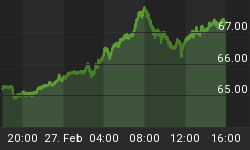The decline of the West, measured in tonnes...
AS THE AGE-OLD Golden Rule puts it, "He who has the gold makes the rules" - an historical fact proven most recently by the United States' dominance of global monetary politics since WWII.
And given gold's critical role in world history, three telling facts are buried amongst the latest central-bank gold data compiled by the World Gold Council...
- Central banks worldwide grew their physical gold reserves at the fastest pace since 1965 in 2009, adding bullion for the first time in two decades as a group;
- Emerging economies added a near-record volume of metal to their official reserves, putting more than 21% of all the gold held by sovereign states outside the control of developed-world OECD members;
- Western central banks, in contrast, shrank their reserves by more than 1% last year. Since the end of 2004, they have sold almost twice-as-much gold as non-OECD members have acquired (1881 vs. 994 tonnes).
Now that Congress is threatening trade sanctions against China for under-valuing its currency, the Yuan, Washington might want to take note of how its Dollar came to be the world's No.1 currency.

Last year marked a "changing pattern" says the World Gold Council, pointing to slower West European sales and "accelerating" purchases by emerging-economy states.
But even noting Moscow's frantic expansion of its gold reserves - primarily bought from domestic mine output, and taking Russia to 9th position in the sovereign league table -the WGC's comments underplay the political implications.
In full-year 2009, emerging-economy states grew their reported reserves by 17.8%, adding 868 tonnes of bullion to build a new record hoard of 5738 tonnes. Yes, China's announcement in April that it had added 454 tonnes to its reserves over the previous six years accounted for a big chunk of that move. But Beijing isn't alone in buying gold. By the end of 2009, non-OECD members held half-as-much gold again as they did on average over the previous six decades.
Like Alan Greenspan said - just before the UK announced it was selling half its national hoard back in May 1999 - "Gold still represents the ultimate form of payment in the world." Add private buying by Asian households over the last 10 years, and the decline of the West becomes much more, when measured in tonnes at least, than a Fox TV headline.
Europe's 30-year tussle last century was preceded and powered by frantic gold hoarding amongst the major players. The Wehrmacht's first stop on annexing central Europe was the local central-bank vault. The US got to dominate monetary politics in 1945 because it ended the war with the biggest hoard of gold bullion in history. Now emerging-market policy wonks, plus their friends and neighbours at home, clearly think the barbarous relic matters. Seeing how Western central-bank gold sales have now ground to a halt, so too might Eurozone ministers...albeit too late to reverse their dis-hoarding at the price those sales raised.















